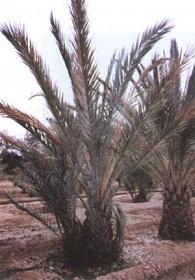Using AI to control energy for indoor agriculture
30 September 2024
Published online 3 November 2010

Researchers in Morocco have bred new date palm trees resistant to Bayoud disease, a fungal disease that threatens date palm plantations in North Africa. The new strains have been planted and trialed for five years at several Moroccan oases and new crops of its sweet fruits are now on sale.
Bayoud disease, a type of vascular wilt, is caused by the fungus Fusarium oxysporum forma specialis albedinis. Cases surfaced in Morocco more than a century ago and quickly spread to neighboring Algeria, Tunisia and Mauritania. Previous strains of date palm resistant to Bayoud disease yielded low-quality fruits. This new strain, called Najda, produces high-quality dates.
The researchers at the National Institute of Agronomic Research (NIAR) had to identify naturally occurring resistant strains and interbreed and test them in the laboratory to develop the new cultivars.
According to Rachid Allaoui, a researcher at NIAR, the new cultivars took 40 years to develop in NIAR's regional centre in Marrakech. "Bayoud wilt has ruined millions of date palms. That is why most of the centre's efforts were directed at developing resistance to it. After actually planting the new cultivars in the soil for five years and monitoring their growths, we can safely say that Najda is resistant to Bayoud."
NIAR now has plans to roll out 200,000 new trees annually, to make up for the date palms lost over the years, explains Allaoui. "These cultivars will be distributed for free to farmers all over the country as a first step. During the second stage, we will send them to neighboring countries that suffer from the disease as well."
However, Nadia Bouguedoura, a researcher leading a team at Université Algiers working on date palms, stressed that the trials results are premature. More tests are needed to ensure the new strains are indeed resistant to the disease. "I think the Moroccan researchers have done some good progress towards finding a solution to this serious disease but we're not done with it yet.
"Najda is well-known and I've followed the progress of their work with great interest, but we need more time to be 100% sure it is resistant, maybe 10 or 20 years."
According to the Food and Agriculture Organization of the United Nations (FAO), Bayoud disease has already destroyed more than 12 million date palms in Morocco and 3 million in Algeria over the past century. It has nearly wiped out several of the best strains of the tree that yield high quality fruits.
doi:10.1038/nmiddleeast.2010.220
Stay connected: